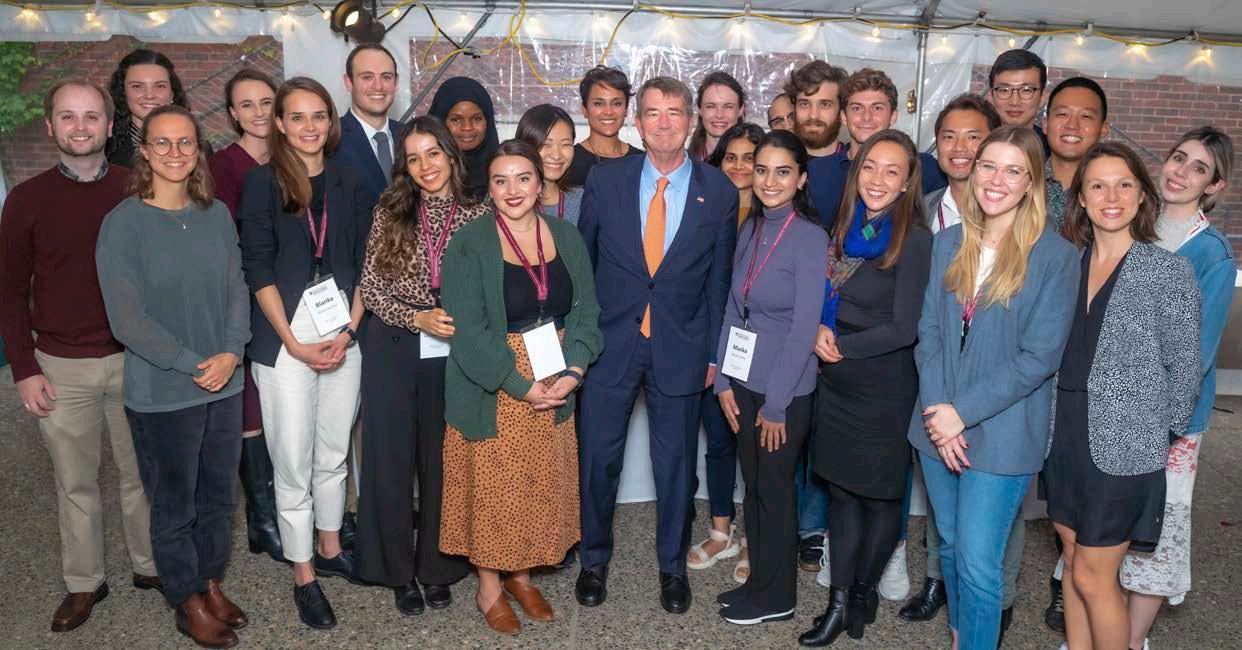
10 minute read
From the Director
An elementary law of physics states that for every action, there is an equal and opposite reaction.
I like to think that a similar phenomenon exists in the Belfer Center’s line of work. In fact, I believe the principle of it is encoded in our DNA: when challenges and crises arise, we respond—and often with greater force and determination.
2021 demonstrated this phenomenon repeatedly. Our community of faculty, staff, students, and fellows rose to meet daunting challenges with extraordinary resolve and expertise. They were unwavering in our mission to advance policy-relevant knowledge and train the next generation of leaders in science, technology, and international affairs.
With these arenas at the forefront of domestic and global conversation, the Center played a critical role this year in advising decision makers across the public and private sector as they grappled with difficult challenges.
• The Homeland Security Project advised leaders on pandemic recovery, including vaccine rollout and immunity to variants. • The Future of Diplomacy Project mapped crucial contours for the
Biden administration’s foreign policy agenda. • The Technology and Public
Purpose Project analyzed the impact of disruptive digital and biotechnologies, such as social media recommendation systems and mRNA therapeutics. • The Environment and Natural
Resources Program offered innovative research and policy options to address the worsening climate crisis. • A group of Center experts, including myself and Co-Director
Eric Rosenbach, provided a retrospective analysis on the war in
Afghanistan.
And this list is just scratching the surface.
I often say that our most important product is people. The Center is proud that well over a dozen of our community members have answered the call to serve in the Biden administration: Nick Burns as U.S. Ambassador to China; Wendy Sherman as U.S. Deputy Secretary of State; Bonnie Jenkins as the Undersecretary of State for Arms Control and International Security Affairs; Eric Lander as Director of the Office of Science and Technology Policy and Science Advisor to the President; Samantha Power as Administrator of the U.S. Agency for International
Development (USAID); Jake Sullivan as the U.S. National Security Advisor; and—pending Senate confirmation— Sasha Baker as Deputy Undersecretary for Policy at the Department of Defense.
We’re also pleased that a new generation of leaders who are recent Harvard Kennedy School graduates and Belfer alums are serving important—and in some cases, very senior—roles as well.
Meredith Berger, Marcus Comiter, Caitlin Conley, Raina Davis, Jeff Fields, Aditi Kumar, Chris McGuire, Lala
Qadir, Aoibhean Thinnes, and Ezinne Uzo-Okoro are helping run important projects on industrial policy, AI, law enforcement, and national security.
Unable to resist a call to serve, I myself became a member of the President’s Council of Advisors on Science and Technology, working with an outstanding group of 29 other technology and policy leaders to address some of the most pressing issues of our time regarding science and technology. I’m also privileged to serve on the Defense Policy Board, helping Secretary Lloyd Austin to manage the world’s largest institution and most consequential security policies.
We do this work not to support a particular administration but to extend good government and to put our mission into practice.
Reflecting the excellence of our research and ability to influence policy, the Belfer Center was named a “think tank of distinction” by the University of Pennsylvania’s 2020 Global Go To Think Tank Index. After claiming the top spot in the university research center category for six years in a row, the Center was ineligible to win again; thus the index’s creation of a new “distinction” label.
I am humbled by the opportunity to lead a center with such conviction, resilience, and impact. I have no doubt that, together, we are building a better future.
Applying History to the Challenges of Today
A unique angle that our scholars provide is applied history. Through some of the most trying times this past year, such as the Capitol riots, the emergence of COVID variants in the midst of scaled vaccinations, and the withdrawal from Afghanistan, our experts provided perspective to the crises by drawing on the most relevant analogs and precedents, sharing wisdom, lessons, and, at times, a measure of calm in an often alarmist world.
To provide just three examples: The Applied History Project’s Calder Walton published a report titled Cold War Disinformation: New Revelations about Operation NEPTUNE from Czech Archives, providing historical perspective about disinformation campaigns similar to those used in the Capitol riots.

April 7, 2021: President Bill Clinton speaks with Nicholas Burns during the Bosworth Memorial Lecture in Diplomacy.
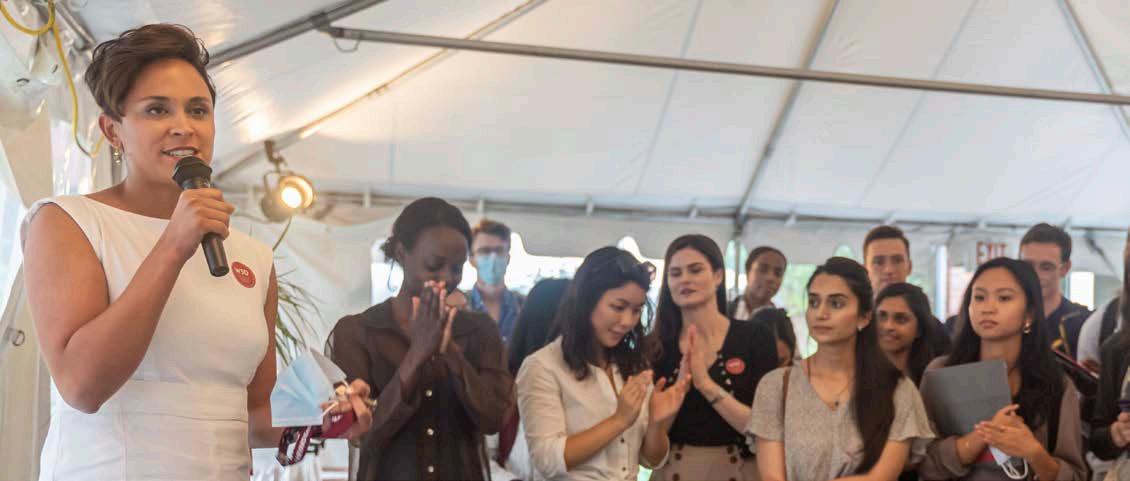
September 14, 2021: Executive Director Natalie Colbert greets students at the Belfer Center Open House.
The Applied History Project’s Fredrik Logevall authored How America Lost Its Way in Afghanistan, adding broader context to the events that culminated in the withdrawal and aftermath this fall.
Looking for ways to help mend a deeply divided nation, our Applied History Project collaborated with the Stanton Foundation on an open competition for essays that best articulated the challenge of reuniting America and identified initiatives the U.S. government or other institutions could take to address it.
Publishing CuttingEdge Research & Informing Policy
Our community published highly influential reports and books this year.
Erica Chenoweth authored a landmark book, Civil Resistance: What Everyone Needs to Know. It’s a sweeping overview of civil resistance movements, explaining what they are, how they work, why they are often effective, and why they can fail.
Henry Lee and Daniel Schrag co-wrote a volume highly relevant for today’s global climate policy work, Foundations for a Low-Carbon Energy System in China.
Other major titles include Venky Narayanamurti’s The Genesis of Technoscientific Revolutions: Rethinking the Nature and Nurture of Research; Niall Ferguson’s Doom: The Politics of Catastrophe; Andrew Porwancher’s The Jewish World of Alexander Hamilton; Nathaniel Moir’s Number One Realist: Bernard Fall and Vietnamese Revolutionary Warfare; Eric Rosenbach’s and Gregory Falco’s Confronting Cyber Risk; and Jacqueline Hazelton’s Bullets Not Ballots: Success in Counterinsurgency Warfare.
Homeland Security Project’s Juliette Kayyem authored Don’t Wait for Herd Immunity, urging policymakers to develop a strategy of risk minimization rather than focusing on reaching herd immunity—something that she claimed we may never reach given the growing population of anti-vaxxers.
Nicola De Blasio, Friodlin Pflugmann, Henry Lee, and accompanying authors from the Environment and Natural Resources Program published a report titled Mission Hydrogen: Accelerating the Transition to a Low Carbon Economy, in which they outlined the public and private sector coordination required to accelerate this energy transition and help mitigate the climate crisis.
The Technology and Public Purpose Project published a set of Technology Factsheets for Policymakers on battery technology, vaccine platforms, and differential privacy. Each factsheet includes a brief technical primer and key considerations for policymakers as they consider governance schemes for a given emerging technology.
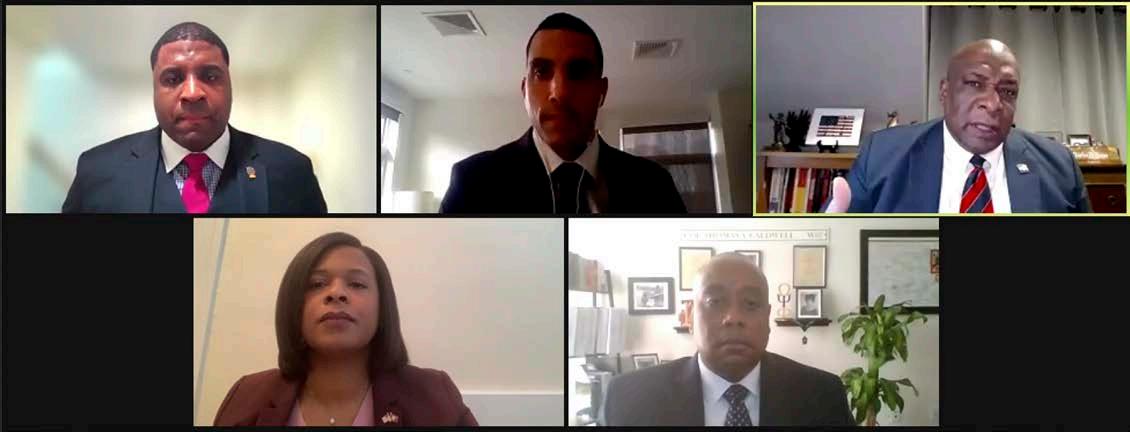
February 25, 2021: In honor of Black History Month, the Defense Project held an event moderated by Lt. Gen. (ret) Charles W. Hooper, top right, on
Diversity in the Military Services. Participating in the discussion were Capt. Zeita Merchant, bottom left, LCDR Roosevelt White, top left, Col. Thomas Caldwell, bottom right, and Lt. Col. Matthew Woods, top middle.
Strengthening Our Commitment to Diversity, Inclusion, and Belonging
Diversity, inclusion, and belonging (DIB) initiatives are crucial to our mission. We can’t make good on our pledge to build a more peaceful, secure world unless and until that world is safer and more just for underrepresented groups.
Improving DIB efforts across our research teams has been a top priority. In February, we hosted a centerwide Belfer Policy Chats series for Black History Month. During the six-part series, research teams explored DIB within the context of their own work. For example, the Intelligence Project hosted a conversation with Remi Adeleke and Asha Castleberry-Hernandez on the legacy of Black Americans in national security and intelligence. The Defense Project held an event on Diversity in Military Services, hosted by Lt. Gen. (ret) Charles W. Hooper, Captain Zeita Merchant, Col. Thomas Caldwell, Lt. Col. Matthew Woods, and LCDR Roosevelt White.
Cyber Project Executive Director Lauren Zabierek is the co-founder of #ShareTheMicInCyber initiative, which aims to elevate Black voices in cybersecurity and privacy disciplines. In March, during Women’s History Month, she hosted an event titled Celebrating Black Women in Cybersecurity and Privacy to honor the work of her Black colleagues.
Across Belfer’s research areas, from Managing the Atom and Russia Matters to the Arctic Initiative and International Security Journal, our researchers are finding new ways to engage diverse and emerging scholars from under-represented or marginalized groups in the U.S. and around the globe.
Along with Co-Director Eric Rosenbach and Executive Director Natalie Colbert, we are strengthening these and related efforts, particularly in recruiting and hiring efforts. Several staff members and fellows from around the Center are dedicating their time and ideas to advance our DIB goals; and the Center continues to host regular meetings with staff and faculty to ensure we are providing the space and resources to promote sustainable and meaningful change.
Although we have a long way to go, we have made great strides over the past year and I am heartened by the energy my colleagues have shown in pursuit of further progress.
Returning to Campus & Reuniting Our Community
This August, we got to reunite as a community after an extended remote period. Since then, we’ve been operating in hybrid mode, with the small pleasures of hallway conversations and in-person classes to brighten our days. I’m also reminded that no small degree of learning happens during organic conversations with speakers and students outside of formal events and teaching periods.
To add to our joy of reconvening, our community was larger than ever. The Belfer Center welcomed a record number of more than 250 fellows. Among them: Senior Belfer Center Fellows Dr. Shirley Ann Jackson, President of Rensselaer Polytechnic Institute; Beth Sanner, former Deputy Director of National Intelligence for Mission Integration; and Lori Garver, former Deputy Administrator of NASA. We were also able to welcome many new colleagues to our team—including our terrific new Executive Director, Natalie Colbert. Natalie is an HKS graduate who joined Belfer in July after serving in the Central Intelligence Agency for 13 years.
With so many members of our Belfer team answering their call to service, we endured some bittersweet transitions this year. Bidding our friends farewell was tough, but it also reminded us that we are living up to our mission of training the next generation of leaders. That makes me proud. It also gives me hope for our future.

As with any era of great change, we have a lot of work ahead of us: adapting to the evolving pandemic landscape, securing our information ecosystem, mending deep political divisions across the country and the world, and exercising resilience after so much heartbreaking loss over the past two years. Though these are undoubtedly heavy tasks, I have steadfast confidence in the Center’s ability to rise to these challenges and build a path forward. After all, it’s in our DNA.
As ever, Eric, Natalie, and I are grateful for the Belfer team. With great minds and big hearts at work, it is hard to be anything but hopeful—no matter what challenges come our way.
Ash Carter
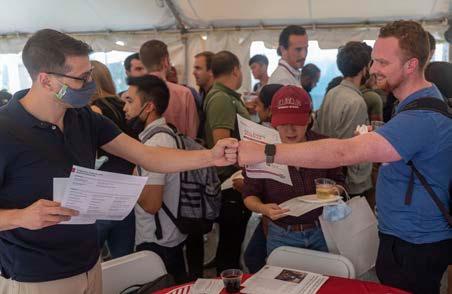
September 14, 2021: Students connect while exploring
opportunities at the Belfer Center Open House.
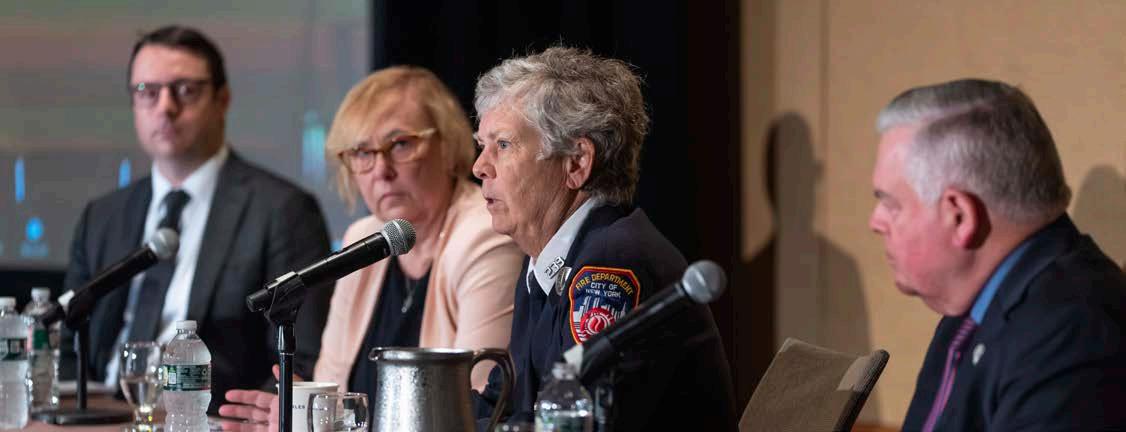
September 10, 2021: Michael Miner, left, moderates a panel with Ann Van Hine, Brenda Berkman, and Steve Kern on the societal and personal impacts of
9/11 during the conference “9/11—Intelligence and National Security Twenty Years Later.”
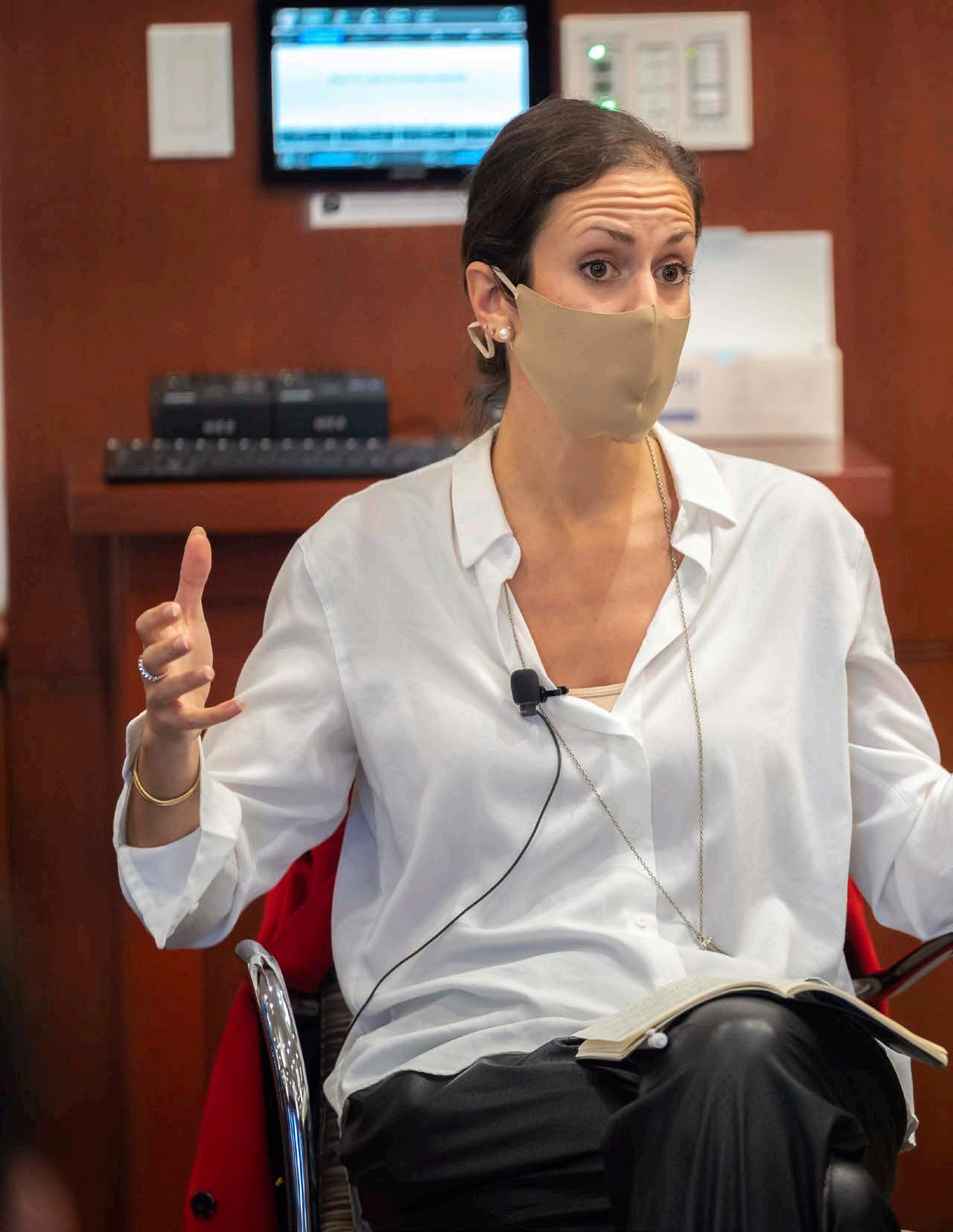

Forward-Looking Analysis
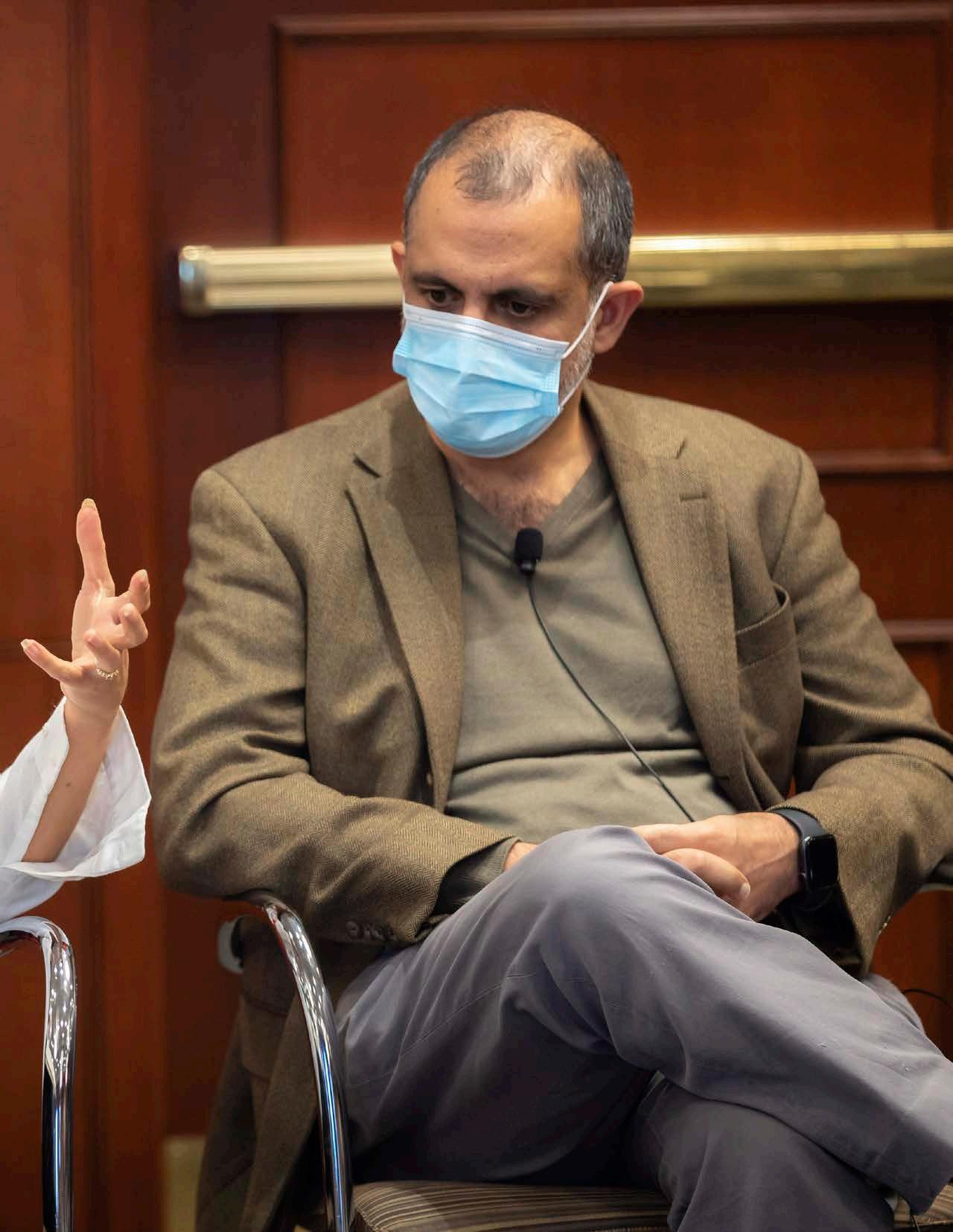
November 1, 2021: Zoe Marks spoke on a panel with Asim Khwaja, pictured at right,



